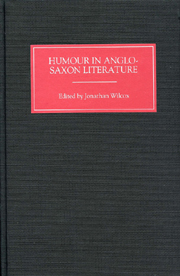Book contents
- Frontmatter
- Contents
- Contributors
- Acknowledgements
- Introduction
- Byrhtnoth's Laughter and the Poetics of Gesture
- ‘Grim Wordplay’: Folly and Wisdom in Anglo-Saxon Humor
- Humor, Wordplay, and Semantic Resonance in Beowulf
- Heroic Humor in Beowulf
- Humor in Hiding: Laughter Between the Sheets in the Exeter Book Riddles
- Sexual Humor and Fettered Desire in Exeter Book Riddle 12
- ‘Why do you speak so much foolishness?’ Gender, Humor, and Discourse in Ælfric's Lives of Saints
- A Funny Thing Happened on the Way to Heaven: Humorous Incongruity in Old English Saints' Lives
- Index
Humor, Wordplay, and Semantic Resonance in Beowulf
Published online by Cambridge University Press: 12 September 2012
- Frontmatter
- Contents
- Contributors
- Acknowledgements
- Introduction
- Byrhtnoth's Laughter and the Poetics of Gesture
- ‘Grim Wordplay’: Folly and Wisdom in Anglo-Saxon Humor
- Humor, Wordplay, and Semantic Resonance in Beowulf
- Heroic Humor in Beowulf
- Humor in Hiding: Laughter Between the Sheets in the Exeter Book Riddles
- Sexual Humor and Fettered Desire in Exeter Book Riddle 12
- ‘Why do you speak so much foolishness?’ Gender, Humor, and Discourse in Ælfric's Lives of Saints
- A Funny Thing Happened on the Way to Heaven: Humorous Incongruity in Old English Saints' Lives
- Index
Summary
It is unlikely that even the most diplomatically trenchant preamble can avoid repetition or, for that matter, elevate the pros and cons surrounding the subject of humor much above the Rubáiyát level.
Myself when young did eagerly frequent
Doctor and saint, and heard great Argument
About it and about: but evermore
Came out by the same Door as in I went.
Arguments ‘about it and about’, when it is humor, are ineluctably ad hominem and are, therefore, as likely to offend as to persuade. The inherent polysemy of natural language is the starting point of the following essay, which approaches humor, not as something that can be reduced to another mechanism, but as a ‘felt change of consciousness’ experienced through language as the boundary between material and non-material worlds. Polysemy and thus wordplay depend upon the capacity of words to cross what the poet Emily Dickinson calls the ‘magical frontier’, between the particular and the universal.
The battle lines between strictly literal and imaginative minds remain pretty much where Joseph Addison drew them in his prescient 1710 attack upon carnivalesque language. Language, he complains, all too easily degenerates into a wild ‘party of puns’ and becomes a false ‘world of magic’. Addison's instinctive preference for the security and propriety of syfernys, ‘sobriety’, is, of course, hardly new in the English tradition. The formidable Wulfstan centuries before him lectures us not to be ealles to hlagole, ‘given always to laughter’.
- Type
- Chapter
- Information
- Humour in Anglo-Saxon Literature , pp. 49 - 70Publisher: Boydell & BrewerPrint publication year: 2000



